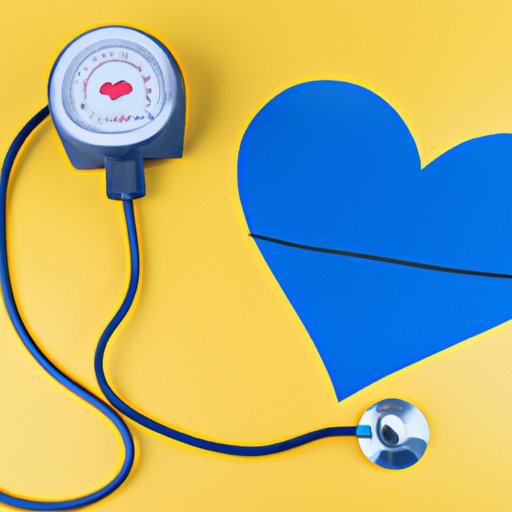
I. Introduction
High blood pressure and heart disease are two major health concerns that are closely related. High blood pressure is a common condition that can lead to serious health problems, including heart disease. In this article, we will explore the connection between high blood pressure and heart disease, and provide practical tips for lowering high blood pressure and preventing heart disease.
II. The Hidden Link Between High Blood Pressure and Heart Disease
High blood pressure is a condition in which the force of blood against the walls of the arteries is too high. Over time, this can cause damage to the arteries and put strain on the heart. The heart has to work harder to pump blood, which can lead to heart damage and other complications.
Studies have shown that high blood pressure is a major risk factor for heart disease. In fact, people with high blood pressure are more likely to develop heart disease than those with normal blood pressure levels.
III. The Silent Killer: Understanding the Connection between High Blood Pressure and Heart Disease
High blood pressure is often referred to as a “silent killer” because it can remain unnoticed for years while damaging the arteries and leading to serious health problems. According to the American Heart Association, nearly half of American adults have high blood pressure or are taking medication to lower it.
High blood pressure is a major risk factor for heart disease, which is the leading cause of death in the United States. In fact, every year, heart disease kills more Americans than all types of cancer combined. High blood pressure-related heart disease can cause heart attacks, strokes, and other serious complications.
IV. Debunking Common Misconceptions about High Blood Pressure and Heart Disease
There are many myths and misconceptions about high blood pressure and heart disease. One of the most common misconceptions is that high blood pressure only affects older adults. In reality, high blood pressure can occur at any age, and even children can be affected.
Another common myth is that high blood pressure is not a serious condition. However, high blood pressure can cause serious damage to the arteries and lead to other health problems, including heart disease. It is important to take steps to lower high blood pressure and prevent further damage.
V. Preventing Heart Disease: The Role High Blood Pressure Reduction Plays
The good news is that high blood pressure can often be controlled with lifestyle changes and medication. If you have high blood pressure, your doctor may recommend changes to your diet, exercise habits, and stress levels.
Some practical tips for reducing high blood pressure include eating a healthy diet that is low in sodium, maintaining a healthy weight, getting regular exercise, and reducing stress. Your doctor may also recommend medication to help lower your blood pressure.
VI. Is High Blood Pressure a Warning Sign for Heart Disease? Exploring the Scientific Evidence.
There is a strong link between high blood pressure and heart disease. In fact, research has shown that high blood pressure is one of the most important risk factors for heart disease. People with high blood pressure are more likely to experience heart attacks, strokes, and other complications.
It is also important to monitor and manage high blood pressure, even if you have not been diagnosed with heart disease. Regular blood pressure checks can help detect high blood pressure early and prevent further damage to your heart and arteries.
VII. Conclusion
High blood pressure and heart disease are serious health concerns that are closely related. However, with the right lifestyle changes and medical treatments, you can lower your blood pressure and reduce your risk of heart disease. By following the tips and information provided in this article, you can take control of your health and prevent serious complications.





